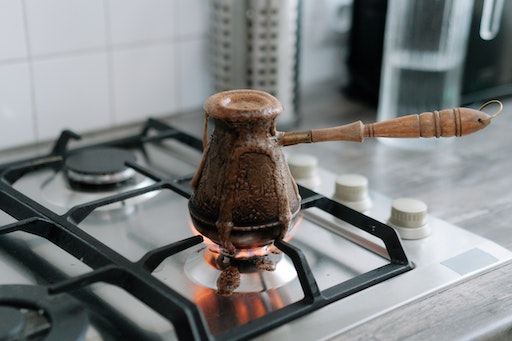History of Coffee in Turkey:
Coffee was introduced to the Ottoman Empire in the 16th century, likely through Yemeni traders. It quickly gained popularity and became an essential part of Turkish culture. The first coffeehouses opened in Istanbul in the mid-16th century were established in the Tahtakale district, near the Spice Bazaar. The Coffee Houses served as social hubs for intellectual discussions, political debates, and entertainment.
Evolution of Coffee in Turkey:
Over time, Turkish coffee developed its unique preparation method, which involves finely ground coffee beans, water, and sugar, brewed in a special pot called a cezve. The coffee is served in small cups, often accompanied by sweets or Turkish delight. Coffeehouses continued to be important social centers, and the tradition of fortune-telling from coffee grounds emerged.
Coffee in Present Day Turkey:
Today, coffee remains a popular beverage in Turkey, with many people enjoying it daily. However, the Turkish coffee faces competition from other types of coffee, such as instant coffee and espresso-based drinks. Traditional coffeehouses still exist, but modern cafes are also widespread.
Consumption of Coffee in Turkey:
As per the different sources Turkey consumes between 0.4 and 1.0 kgs of coffee per person per year. It is still widely consumed beverage but only about 25% of tea consumption in Turkey.
Coffee in Turkish tradition and social life:
1. Social gatherings:
Coffee has been an integral part of social gatherings in Turkey for centuries. Friends and family often come together to enjoy Turkish coffee, accompanied by conversation and sometimes sweets or Turkish delight. It is a symbol of hospitality and a way to strengthen bonds between people.
2. Turkish Coffeehouses:
Traditional Turkish coffeehouses, or kahvehane, have been important social centers since the 16th century. They served as places for intellectual discussions, political debates, and entertainment, such as poetry readings and live music. Although modern cafes have become more prevalent, traditional coffeehouses still exist and continue to be a part of Turkish culture.
3. Turkish Coffee:
Coffee became such an integral part of the Turkish culture that they developed a unique way of brewing their coffee in a special pot called a cezve. The coffee is ground very finely and brewed with water and sugar to create a thick, frothy beverage that is served in small cups. The preparation and serving of Turkish coffee is considered an art form, and there are many customs and traditions associated with it.
4. Rituals and ceremonies:
Turkish coffee plays a role in various rituals and ceremonies, such as engagements and weddings. For example, during a traditional engagement ceremony, the groom’s family visits the bride’s family, and the bride serves coffee to the guests. The groom’s coffee is sometimes prepared with salt instead of sugar as a playful gesture and a test of his patience.
5. Fortune-telling:
Reading coffee grounds, or tasseography, is a popular pastime in Turkey. After finishing a cup of Turkish coffee, the grounds left at the bottom are used to predict the drinker’s future.
Overall, the cultural traditions of coffee in Turkey reflect the country’s rich history and traditions, and the preparation and serving of Turkish coffee is considered an important part of Turkish culture.
Recipe for Turkish Coffee:
Turkish coffee is a unique style of coffee that is brewed in a special pot called a cezve. Here is a detailed recipe for making Turkish coffee:
Ingredients for Turkish Coffee:
- 1 tablespoon finely ground Turkish coffee
- 1 cup of water
- Sugar (optional)
Instructions for making Turkish Coffee:
- Fill the cezve with water and place it on the stove to heat. Do not bring the water to a boil.
- Once the water is hot, remove the cezve from the heat and add the finely ground Turkish coffee. Stir the coffee into the water.
- Return the cezve to the stove and heat the coffee over low heat. Do not let the coffee boil.
- As the coffee heats, a frothy layer will form on top. Once the froth has formed, remove the cezve from the heat.
- Pour the coffee into small cups, making sure to distribute the froth evenly between the cups.
- If desired, add sugar to taste.
- Serve the coffee with a small glass of water and a piece of Turkish delight or other sweet treat.
Note: Turkish coffee is traditionally served without milk. The strength of the coffee can be adjusted by adding more or less coffee grounds or by heating the coffee for a shorter or longer period of time. The key to making good Turkish coffee is to heat it slowly and avoid boiling it.
Special utensils used for making and serving Turkish Coffee:
Turkish coffee is traditionally brewed and served using special utensils that are unique to Turkish culture. Here are some details about the special utensils used in Turkish coffee making and drinking:
- Cezve:
The cezve is a special pot that is used to brew Turkish coffee. It is typically made of copper or brass and has a long handle and a spout for pouring the coffee. The size of the cezve is important, as it determines the amount of coffee that can be brewed at one time. - Fincan:
The fincan is a small, handle-less cup that is used to serve Turkish coffee. The cup is typically made of porcelain or ceramic and is often decorated with traditional Turkish designs. - Tabak:
The tabak is a small plate or saucer that is used to hold the fincan. It is typically made of ceramic or porcelain and is often decorated with traditional Turkish designs. - Şekerlik:
The şekerlik is a small sugar bowl that is used to hold sugar cubes or loose sugar. It is typically made of glass or metal and is often decorated with traditional Turkish designs. - Kahve takımı:
The kahve takımı is a set of utensils that includes the cezve, fincan, tabak, and şekerlik. It is often sold as a set and is designed to be used specifically for brewing and serving Turkish coffee. - Tepsiler:
Tepsiler are small trays that are used to serve Turkish coffee. They are typically made of metal or wood and are often decorated with traditional Turkish designs.
Overall, the special utensils used in Turkish coffee making and drinking reflect the importance of coffee in Turkish culture and the attention to detail that is given to the preparation and presentation of the coffee. The use of traditional designs and materials also reflects the country’s rich cultural heritage.




